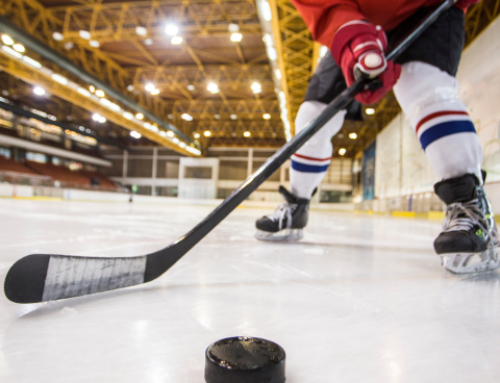Athlete Nutrition: Focus on These 5 Things
Want to improve your eating habits but not sure how? Here is a snapshot of the most important components of nutrition for athletes.
1. Morning and workout nutrition
Eat breakfast within 30 minutes of waking up. Breakfast fuels your body and gets your metabolism going. (Don’t forget, your body burns calories while you sleep.)
To get the protein and healthy calories you need to jumpstart your day, try three eggs, three slices of wheat toast with butter (or a bagel with cream cheese), two slices of bacon or turkey sausage, a glass of orange juice, a glass of water and a piece of fruit.
RELATED: 5 Savory Breakfast Ideas for Athletes
Pre-workout/practice (30 to 60 minutes prior to exercise). Topping off your energy stores before exercise ensures you will have sufficient fuel to power you through. Instead of taking pre-exercise supplements—which might contain ingredients that can either steer your digestive tract the wrong way or give you an allergic reaction—eat a piece of fruit.
Post-workout/practice (within 30 minutes after exercise). During a workout you tear up your muscles. Help them recover with proper food and fluid within 30 minutes after a training session. Post-workout nutrition:
- Increases glycogen storage and promotes protein synthesis
- Provides carbohydrates for refueling and amino acids to rebuild muscle protein
- Prevents protein breakdown
The goal for your post-workout meal is to prepare your body for the next round of activity. Don’t settle only for protein. Give yourself some carbs to re-energize your body. Fruits, vegetables, chicken and protein drinks are all great choices for post-workout meals.
2. Eat every two to three hours
Eating small meals frequently throughout the day (rather than fewer, larger meals) balances your blood sugar. You constantly burn calories throughout the day, and glucose is a major energy generator. Balancing your blood sugar can alleviate the sudden feeling of lightheadedness or fatigue.
RELATED: 10 Nutrition Rules To Live By
Eating small meals gives you a feeling of fullness, which prevents you from overeating. It also reduces LDL (or “bad”) cholesterol and contraregulatory (stress) hormones, which inhibit the function of other hormones. In addition, larger meals may put too many carbs in your body at one time, causing you to crash after meals.
3. Stay hydrated
Losing just 2 percent of your body weight in fluid can cause fatigue, cramping and water retention. It can also decrease your mental performance, fine motor skills, endurance and work capacity.
RELATED: 7 Rules for Keeping Hydrated
To give you an idea of the importance of water for bodily function, here’s a chart showing the amount of water in various body parts and organs.
|
BODY PART OR ORGAN |
PERCENTAGE OF WATER |
| Skin | 64% |
| Skeleton | 31% |
| Muscles | 79% |
| Brain | 73% |
| Liver | 71% |
| Heart | 73% |
| Lungs | 83% |
| Kidneys | 79% |
4. Eat 5-plus servings of fruits/vegetables daily
Fruits and vegetables reduce the loss of bone strength and muscle mass. They contain higher amounts of fiber than other foods, and fiber aids digestion and carries nutrients to muscle cells. Fruits and vegetables have a higher micro-nutrient (vitamins & minerals) to macro-nutrient (carbohydrates, protein, fats) ratio, and manage your blood sugar.
5. Sleep 8 hours per night
Sleep clears toxins from the brain and decreases cortisol concentration, a risk factor for obesity and diabetes. It also boosts your thyroid levels and increases leptin, a hormone that regulates appetite suppression.
RELATED: Sleep Guidelines for Athletes
References:
Berardi, John & Fry, Michael. (2005). The grappler’s guide to sports nutrition for body composition and performance enhancement (electronic version).
Blood Plasma Volume: “http://spaceflight.nasa.gov/history/shuttle-mir/references/glossaries/science/sc-gloss-n_s.htm”
Aqua Bodies; Healthy Hydration: WATER IN HUMAN ORGANS, Organ Percentage Water “http://www.projectwet.org/sites/default/files/content/documents/hydration-activities.pd
[cf]skyword_tracking_tag[/cf]RECOMMENDED FOR YOU
MOST POPULAR
Athlete Nutrition: Focus on These 5 Things
Want to improve your eating habits but not sure how? Here is a snapshot of the most important components of nutrition for athletes.
1. Morning and workout nutrition
Eat breakfast within 30 minutes of waking up. Breakfast fuels your body and gets your metabolism going. (Don’t forget, your body burns calories while you sleep.)
To get the protein and healthy calories you need to jumpstart your day, try three eggs, three slices of wheat toast with butter (or a bagel with cream cheese), two slices of bacon or turkey sausage, a glass of orange juice, a glass of water and a piece of fruit.
RELATED: 5 Savory Breakfast Ideas for Athletes
Pre-workout/practice (30 to 60 minutes prior to exercise). Topping off your energy stores before exercise ensures you will have sufficient fuel to power you through. Instead of taking pre-exercise supplements—which might contain ingredients that can either steer your digestive tract the wrong way or give you an allergic reaction—eat a piece of fruit.
Post-workout/practice (within 30 minutes after exercise). During a workout you tear up your muscles. Help them recover with proper food and fluid within 30 minutes after a training session. Post-workout nutrition:
- Increases glycogen storage and promotes protein synthesis
- Provides carbohydrates for refueling and amino acids to rebuild muscle protein
- Prevents protein breakdown
The goal for your post-workout meal is to prepare your body for the next round of activity. Don’t settle only for protein. Give yourself some carbs to re-energize your body. Fruits, vegetables, chicken and protein drinks are all great choices for post-workout meals.
2. Eat every two to three hours
Eating small meals frequently throughout the day (rather than fewer, larger meals) balances your blood sugar. You constantly burn calories throughout the day, and glucose is a major energy generator. Balancing your blood sugar can alleviate the sudden feeling of lightheadedness or fatigue.
RELATED: 10 Nutrition Rules To Live By
Eating small meals gives you a feeling of fullness, which prevents you from overeating. It also reduces LDL (or “bad”) cholesterol and contraregulatory (stress) hormones, which inhibit the function of other hormones. In addition, larger meals may put too many carbs in your body at one time, causing you to crash after meals.
3. Stay hydrated
Losing just 2 percent of your body weight in fluid can cause fatigue, cramping and water retention. It can also decrease your mental performance, fine motor skills, endurance and work capacity.
RELATED: 7 Rules for Keeping Hydrated
To give you an idea of the importance of water for bodily function, here’s a chart showing the amount of water in various body parts and organs.
|
BODY PART OR ORGAN |
PERCENTAGE OF WATER |
| Skin | 64% |
| Skeleton | 31% |
| Muscles | 79% |
| Brain | 73% |
| Liver | 71% |
| Heart | 73% |
| Lungs | 83% |
| Kidneys | 79% |
4. Eat 5-plus servings of fruits/vegetables daily
Fruits and vegetables reduce the loss of bone strength and muscle mass. They contain higher amounts of fiber than other foods, and fiber aids digestion and carries nutrients to muscle cells. Fruits and vegetables have a higher micro-nutrient (vitamins & minerals) to macro-nutrient (carbohydrates, protein, fats) ratio, and manage your blood sugar.
5. Sleep 8 hours per night
Sleep clears toxins from the brain and decreases cortisol concentration, a risk factor for obesity and diabetes. It also boosts your thyroid levels and increases leptin, a hormone that regulates appetite suppression.
RELATED: Sleep Guidelines for Athletes
References:
Berardi, John & Fry, Michael. (2005). The grappler’s guide to sports nutrition for body composition and performance enhancement (electronic version).
Blood Plasma Volume: “http://spaceflight.nasa.gov/history/shuttle-mir/references/glossaries/science/sc-gloss-n_s.htm”
Aqua Bodies; Healthy Hydration: WATER IN HUMAN ORGANS, Organ Percentage Water “http://www.projectwet.org/sites/default/files/content/documents/hydration-activities.pd
[cf]skyword_tracking_tag[/cf]










